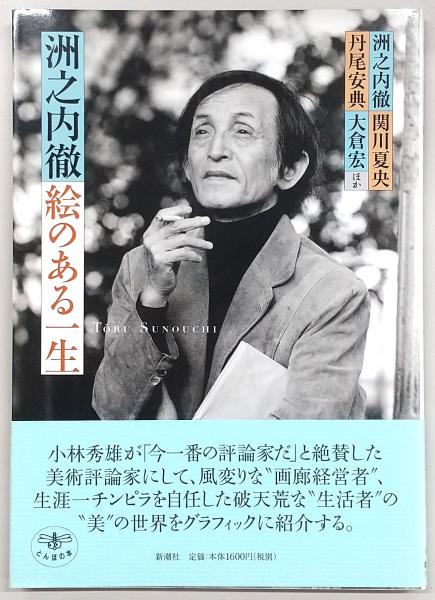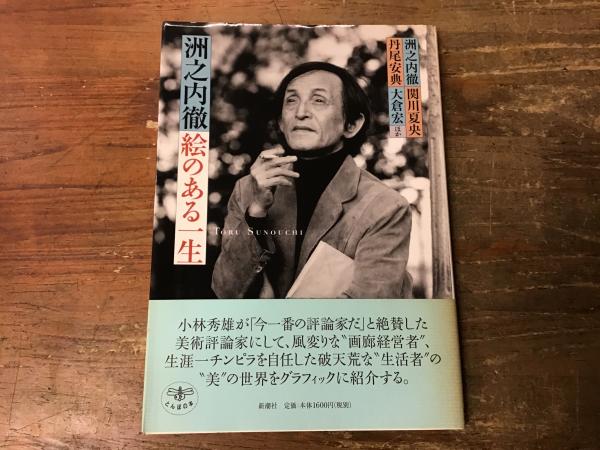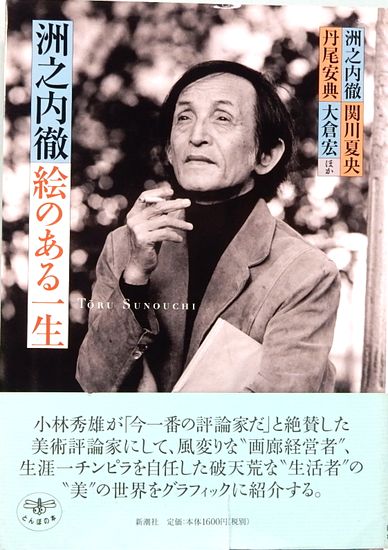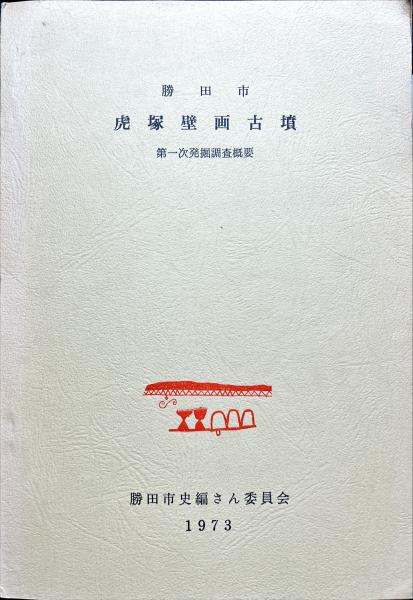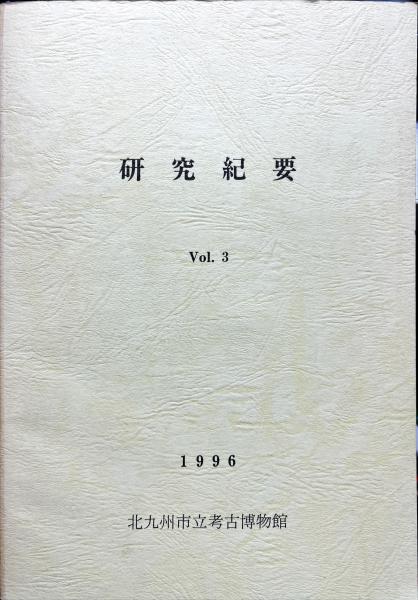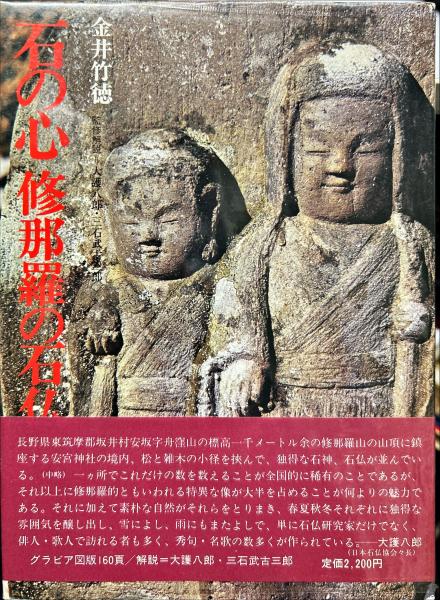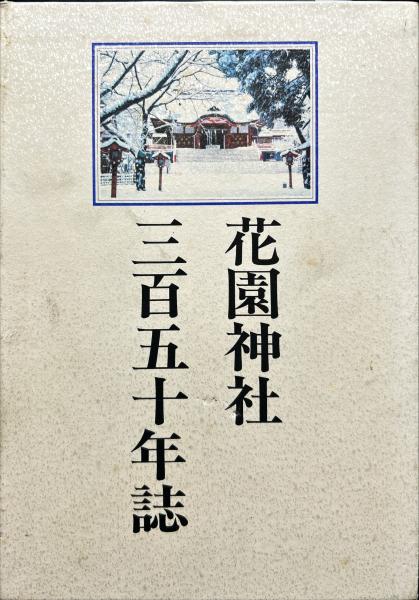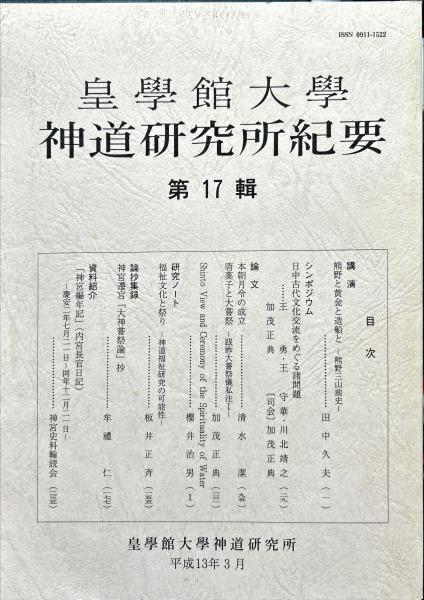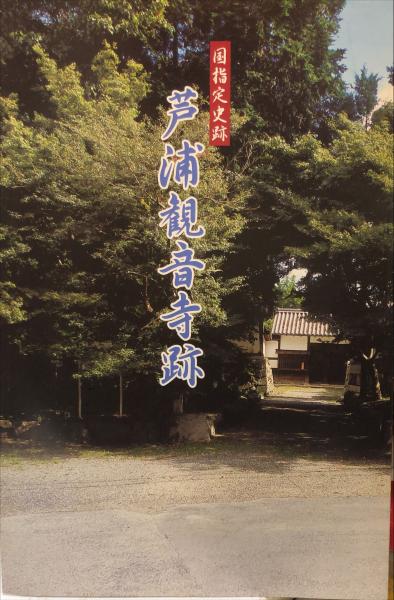
キーワード「洲之内徹 絵のある一生 (とんぼの本)」の検索結果
古書現世
東京都新宿区西早稲田
東京都新宿区西早稲田
¥1,500
洲之内徹、関川夏央、丹尾安典、大倉宏ほか、新潮社、2007年、A5
書き込みなどない古本として普通のコンディションです。カバー帯付き。
【海外発送不可】以下の発送方法のうち最安値で発送します。日本郵便・クリックポスト(185円)、レターパック(3cm以上。600円)、ゆうパック(上記の規格で送れないもの)での発送となります。その他の発送方法は対応していませんのでご了承くださいませ。3000円以上または領収書希望の場合は前払いのみです(領収書希望の方は必ず「宛名」「但し書き」は指定してください)。クレジット決済の場合、3日間決済が無い場合はキャンセルとさせていただきます。後払いの送金料はお客様負担です。
ぶっくいん高知 古書部
高知県高知市福井町
高知県高知市福井町
¥1,540
(送料:¥200~)
洲之内徹, 関川夏央, 丹尾安典, 大倉宏 ほか著、新潮社、2007年、143頁、21cm
初版、帯、カバー、書き込み線引き無し
●12月31日~1月3日まで休業いたします、その間は商品発送は停止いたします、ご了承ください。
●領収書、請求書等をご要望の際は、その旨ご注文時にお知らせください、同封いたします。なお、商品発送後は対応できません。
●インボイス対応・適格請求書、領収書を発行いたします。
●「公費」、「代引き」でのご注文は2200円以上より承ります。
古書 往来座
東京都豊島区南池袋
東京都豊島区南池袋
¥2,200
(送料:¥300~)
洲之内徹, 関川夏央, 丹尾安典, 大倉宏 ほか著、新潮社、143p、21cm
【2007年初版 カバー 帯】帯背ヤケあり。カバー背少ヤケあり。保存状態:並(経年の瑕疵が普通にあるがひどくはない経年並み)
★★年末年始休業:2025/12/30(火)ー2026/1/4(日)★★期間中にご発注いただけますが、在庫確認、ご決済後の発送などのご対応は1/5(月)以降順次となります。なにとぞご容赦くださいませ。★送料は価格の右に表示されている額です(「〜」は無意味です)★公費でのご購入の際は必ず商品詳細ページの「書籍の購入について」をご確認くださいませ
サムタイム
東京都世田谷区太子堂
東京都世田谷区太子堂
¥2,000
関川夏央/丹尾安典/大倉 宏ほか、新潮社、2007年、1冊
【小林秀雄が「今一番の評論家だ」と絶賛した美術評論家にして、風変わりな”画廊経営者”、生涯一チンピラを自任した破天荒な”生活者”の”美”の世界をグラフィックに紹介する。】A5判、ソフトカバー、帯、143pp、本体:経年並、本文:経年並、カバー:経年並、帯:破れと汚れ有り
■特記されたものを除き、送料は無料です。 代金は前払いをお願いしています。 丁寧な梱包、迅速な発送を心掛けています。
もっと見る
書誌カタログから探す
「日本の古本屋」では、書籍ごとの基本情報を「書誌カタログ」にまとめております。書誌カタログからは欲しい本のリクエストが可能です。
お探しの本が「日本の古本屋」に追加された場合に自動通知をお送りさせていただきます。

-
リクエストを送る
-
書籍情報で在庫を検索
もっと見る
ハナ書房の新着書籍
ハナ書房
大阪府大阪市北区天神橋
大阪府大阪市北区天神橋
¥810
北九州市立考古博物館編、勝田市史編さん委員会、1973、16p、26cm
目次
序文 発刊にあたって -
1. 虎塚古墳調査の経過
2. 虎塚古墳の位置・・・・
3. 虎塚古墳の墳丘
4. 石室の前庭と周堀
5. 石室の規模と構造
6. 石室内の状況
7. 石室に描かれた壁画と
虎塚古墳の年代
虎塚古墳の年代·
石室 壁画の保存措置について·
あとがき
図版目次
巻頭図版 1 (カラー)
虎塚古墳石室奥壁(全景)
巻頭図版 2 (カラー)
虎塚古墳石室東壁(部分)
(1) 虎塚古墳周辺の地形・・
(2) 虎塚古墳の全景 (東南側より)
(3) 虎塚古墳墳丘実測図
(4) 後円部南側のトレンチの設定
(5) 後円部石室正面 前庭部全景
(6) 後円部石室の発見(第1トレンチ
(7) 石室正面の閉塞状況・
(8) 石室正面玄室入口扉石閉塞状況・
(9) 石室正面玄室入口扉石除去後の状況 9
(10) 石室実測図
(11) 石室内遺骸 副葬品の状況
(12) 石室および壁画実測図
(13) 壁画 (東壁部分)
(14) 壁画 (西壁部分)
グラシン紙包装にてお届け致します。
序文 発刊にあたって -
1. 虎塚古墳調査の経過
2. 虎塚古墳の位置・・・・
3. 虎塚古墳の墳丘
4. 石室の前庭と周堀
5. 石室の規模と構造
6. 石室内の状況
7. 石室に描かれた壁画と
虎塚古墳の年代
虎塚古墳の年代·
石室 壁画の保存措置について·
あとがき
図版目次
巻頭図版 1 (カラー)
虎塚古墳石室奥壁(全景)
巻頭図版 2 (カラー)
虎塚古墳石室東壁(部分)
(1) 虎塚古墳周辺の地形・・
(2) 虎塚古墳の全景 (東南側より)
(3) 虎塚古墳墳丘実測図
(4) 後円部南側のトレンチの設定
(5) 後円部石室正面 前庭部全景
(6) 後円部石室の発見(第1トレンチ
(7) 石室正面の閉塞状況・
(8) 石室正面玄室入口扉石閉塞状況・
(9) 石室正面玄室入口扉石除去後の状況 9
(10) 石室実測図
(11) 石室内遺骸 副葬品の状況
(12) 石室および壁画実測図
(13) 壁画 (東壁部分)
(14) 壁画 (西壁部分)
グラシン紙包装にてお届け致します。
ハナ書房
大阪府大阪市北区天神橋
大阪府大阪市北区天神橋
¥1,200
北九州市立考古博物館編、北九州市立考古博物館、1996、51p、26cm
目次
他龍文鏡および福岡県北九州市近郊から出土した
弥生~古墳時代の青銅製遺物の鉛同位体比・・・・・・・・・・ 平尾 光
鈴木浩子
鉛同位体比の測定対象となった北九州市近郊から
出土した弥生 ~古墳時代の青銅製遺物について・・・・藤丸詔八郎
ノ神式 平栫式土器研究についての覚書
・松永 幸男
序
昭和58年8月、 当博物館は北九州市域ならびに関連する隣接地域
の歴史を考古資料にもとずいて理解する博物館として開館し、 それ
以来、考古学専門の博物館という特色を生かしながら、展示、調査
研究、教育普及の各分野にわたって様々な活動を行ってまいりまし
た。
中でも、調査研究は博物館の諸活動を支える根幹的な活動のひと
つであり、その成果は資料収集や展示に、そして教育普及活動に反
映されてまいりました。
平成7年度も、東京国立文化財研究所保存科学部のご協力をいた
だき、 龍文鏡ならびに市内近郊から出土した弥生~古墳時代の青
銅製遺物について鉛同位体比を測定していただきました。 本紀要に
は、それらの成果と併せて、測定の対象になった青銅製遺物の紹介
ならびに南九州における縄文早期の土器研究に関する論攷を収録し
ました。
これらの成果が今後の博物館活動の資となり、 また、 北九州市の
文化向上に役立つことを願っております。
平成8年6月
背少ヤケ グラシン紙包装にてお届け致します。
他龍文鏡および福岡県北九州市近郊から出土した
弥生~古墳時代の青銅製遺物の鉛同位体比・・・・・・・・・・ 平尾 光
鈴木浩子
鉛同位体比の測定対象となった北九州市近郊から
出土した弥生 ~古墳時代の青銅製遺物について・・・・藤丸詔八郎
ノ神式 平栫式土器研究についての覚書
・松永 幸男
序
昭和58年8月、 当博物館は北九州市域ならびに関連する隣接地域
の歴史を考古資料にもとずいて理解する博物館として開館し、 それ
以来、考古学専門の博物館という特色を生かしながら、展示、調査
研究、教育普及の各分野にわたって様々な活動を行ってまいりまし
た。
中でも、調査研究は博物館の諸活動を支える根幹的な活動のひと
つであり、その成果は資料収集や展示に、そして教育普及活動に反
映されてまいりました。
平成7年度も、東京国立文化財研究所保存科学部のご協力をいた
だき、 龍文鏡ならびに市内近郊から出土した弥生~古墳時代の青
銅製遺物について鉛同位体比を測定していただきました。 本紀要に
は、それらの成果と併せて、測定の対象になった青銅製遺物の紹介
ならびに南九州における縄文早期の土器研究に関する論攷を収録し
ました。
これらの成果が今後の博物館活動の資となり、 また、 北九州市の
文化向上に役立つことを願っております。
平成8年6月
背少ヤケ グラシン紙包装にてお届け致します。
ハナ書房
大阪府大阪市北区天神橋
大阪府大阪市北区天神橋
¥1,100
金井竹徳 著、東出版、1980-11、225p (おもに図)、22cm
長野県東筑摩郡坂井村安坂字舟窪山の標高一千メートル余の修那羅山の山頂に鎮
座する安宮神社の境内、 松と雑木の小径を挟んで、独得な石神、 石仏が並んでい
る。 (中略) 一ヵ所でこれだけの数を数えることが全国的に稀有のことであるが、
それ以上に修那羅的ともいわれる特異な像が大半を占めることが何よりの魅力で
ある。 それに加えて素朴な自然がそれらをとりまき、春夏秋冬それぞれに独得な
雰囲気を醸し出し、雪によし、雨にもまたよしで、単に石仏研究家だけでなく、
俳人・歌人で訪れる者も多く、 秀句・名歌の数多くが作られている。大護八郎
グラビア図版 160頁/解説=大護八郎 三石武古三郎
ビニールカバー 帯
座する安宮神社の境内、 松と雑木の小径を挟んで、独得な石神、 石仏が並んでい
る。 (中略) 一ヵ所でこれだけの数を数えることが全国的に稀有のことであるが、
それ以上に修那羅的ともいわれる特異な像が大半を占めることが何よりの魅力で
ある。 それに加えて素朴な自然がそれらをとりまき、春夏秋冬それぞれに独得な
雰囲気を醸し出し、雪によし、雨にもまたよしで、単に石仏研究家だけでなく、
俳人・歌人で訪れる者も多く、 秀句・名歌の数多くが作られている。大護八郎
グラビア図版 160頁/解説=大護八郎 三石武古三郎
ビニールカバー 帯
ハナ書房
大阪府大阪市北区天神橋
大阪府大阪市北区天神橋
¥710
インスクリプト 市民セクター政策機構、2017-7、147p、25.5cm
目次
特集
Social Good News
THE TRAILER
ワクチンで子どもは守れるか?
医療と製薬会社の癒着を問う
I 薬害の構造を根本から見直す
FOR READERS
何も知らない子どもたちを被害者にしないために
なぜ薬害は繰り返されるのか
外資系製薬会社の"実験場 " 日本
予防接種に行く前に
知っておきたいワクチンのこと
MMR (新三種混合) ワクチン被害を伝える
被害児の家族としての体験から被害者支援を行う
「子宮頸がんワクチン」 薬害を伝える
二度と同じ被害を繰り返さないために
「子宮頸がんワクチン」の薬害訴訟が目指すもの
ワクチン問題Q&A
悼みの列島 日本を語り伝える第4回
神戸の碑文に見るさまざまな戦争の記憶
おしどりマコの知りたがりの日々・レッツ想定外! 最終回
調べ考えモノ言って、社会運動しましょうぜ
美本
特集
Social Good News
THE TRAILER
ワクチンで子どもは守れるか?
医療と製薬会社の癒着を問う
I 薬害の構造を根本から見直す
FOR READERS
何も知らない子どもたちを被害者にしないために
なぜ薬害は繰り返されるのか
外資系製薬会社の"実験場 " 日本
予防接種に行く前に
知っておきたいワクチンのこと
MMR (新三種混合) ワクチン被害を伝える
被害児の家族としての体験から被害者支援を行う
「子宮頸がんワクチン」 薬害を伝える
二度と同じ被害を繰り返さないために
「子宮頸がんワクチン」の薬害訴訟が目指すもの
ワクチン問題Q&A
悼みの列島 日本を語り伝える第4回
神戸の碑文に見るさまざまな戦争の記憶
おしどりマコの知りたがりの日々・レッツ想定外! 最終回
調べ考えモノ言って、社会運動しましょうぜ
美本
ハナ書房
大阪府大阪市北区天神橋
大阪府大阪市北区天神橋
¥710
インスクリプト 市民セクター政策機構、2017-4、80p、25.5cm
目次
特集
20年後、子どもたちの貧困問題
格差社会を終わらせよう!
今から10年前
FOR READERS
「貧困は自己責任」と放置すれば日本は危機的状況になる
Ⅰ 女性、若者たちの「現在」
すべての少女に「衣食住」と「関係性」を!
少女から搾取しない社会へ
なぜ、女性は貧困なのか
3人の事例から考える
企業は激変し若者は貧困を強いられた
Ⅱ 子どもたちのための「未来の創り方」
福祉の限界を超える
町民すべてが生涯現役
生きづらさを抱える若者を地域で支援する
NPO法人リロード、ワーカーズ・コレクティブはっぴいさん
貧困対策に必要なのは連帯への意識転換
社会の分断を消す選択肢をつくる
オランダの子どもはなぜ「幸せ」なのか
悼みの列島 日本を語り伝える第3回
信州に遺る満州に渡った人びとの思い
おしどりマコの知りたがりの日々・レッツ想定外! 第6回
ドイツの脱原発の動きは次のステージへ
他・・
美本
特集
20年後、子どもたちの貧困問題
格差社会を終わらせよう!
今から10年前
FOR READERS
「貧困は自己責任」と放置すれば日本は危機的状況になる
Ⅰ 女性、若者たちの「現在」
すべての少女に「衣食住」と「関係性」を!
少女から搾取しない社会へ
なぜ、女性は貧困なのか
3人の事例から考える
企業は激変し若者は貧困を強いられた
Ⅱ 子どもたちのための「未来の創り方」
福祉の限界を超える
町民すべてが生涯現役
生きづらさを抱える若者を地域で支援する
NPO法人リロード、ワーカーズ・コレクティブはっぴいさん
貧困対策に必要なのは連帯への意識転換
社会の分断を消す選択肢をつくる
オランダの子どもはなぜ「幸せ」なのか
悼みの列島 日本を語り伝える第3回
信州に遺る満州に渡った人びとの思い
おしどりマコの知りたがりの日々・レッツ想定外! 第6回
ドイツの脱原発の動きは次のステージへ
他・・
美本
ハナ書房
大阪府大阪市北区天神橋
大阪府大阪市北区天神橋
¥1,600
皇后陛下 著 ; 大東出版社 企画・編集、花園神社、2000-6、342p、22cm
目次
花園神社 三百五十年誌
年誌 下
祝辞
第I部目次
挨拶 片山文彦(宮司)
花園神社
第一章
創建三百五十年祭
新宿鎮守
第二章
花園神社の十二ヵ月
廃墟の中からの出発
第三章
新宿と花園神社の戦後史
第四章
境内を彩る
イベントの数々
第五章
町中が興奮の坩堝に
花園神社の例大祭
第六章
地域の人びとの
集いの場
第Ⅱ部目次
花園神社 三百五十年のあゆみ <戦後編>
戦後史の概略
(一)新宿と共に復興
(二) 例大祭と年中行事
(三) 花園神社と芸能
回想・花園神社と新宿
(一)私と花園神社
(二)私と新宿
(三) 文学に出てくる花園神社
地域の人びとと共に
(1)神道時事問題研究会の三十年
(二)広がる交流と人の輪
卷末資料
参考文献一覧
総代一覧
顧問一覧
相談役一覧
奉賛会理事一覧
V 編集後記
函 表紙少シミ 本文美
送料 レターパックプラス(厚さ3cm上)
花園神社 三百五十年誌
年誌 下
祝辞
第I部目次
挨拶 片山文彦(宮司)
花園神社
第一章
創建三百五十年祭
新宿鎮守
第二章
花園神社の十二ヵ月
廃墟の中からの出発
第三章
新宿と花園神社の戦後史
第四章
境内を彩る
イベントの数々
第五章
町中が興奮の坩堝に
花園神社の例大祭
第六章
地域の人びとの
集いの場
第Ⅱ部目次
花園神社 三百五十年のあゆみ <戦後編>
戦後史の概略
(一)新宿と共に復興
(二) 例大祭と年中行事
(三) 花園神社と芸能
回想・花園神社と新宿
(一)私と花園神社
(二)私と新宿
(三) 文学に出てくる花園神社
地域の人びとと共に
(1)神道時事問題研究会の三十年
(二)広がる交流と人の輪
卷末資料
参考文献一覧
総代一覧
顧問一覧
相談役一覧
奉賛会理事一覧
V 編集後記
函 表紙少シミ 本文美
送料 レターパックプラス(厚さ3cm上)
ハナ書房
大阪府大阪市北区天神橋
大阪府大阪市北区天神橋
¥1,200
皇后陛下 著 ; 大東出版社 企画・編集、大東出版社、1997、238p、22cm
刊行のことば
前社主、岩野喜久代の晩年の大きな望みであった皇后様の御歌集が
完成し、ここに刊行の運びとなりました。望外の喜びであり、感謝の
思いで一杯でございます。
自身も歌人であった故人は、常々、歌は人なり、心なり、と申し、
皇后様の御歌の品格と、御歌ににじむ真摯で、優しいお心とを、深く
尊んでおりました。御歌を皇后様と国民との間の、更には皇室と国民
との間の絆と考え、御歌集刊行を切望しつつ没しました故人に代わり、
ご多用の中ご協力頂きました宮内庁の方々、挿し絵、題字にご協力頂
きました堀文子様、松村篠舟様に厚く御礼を申し上げます。
御歌の背景となる皇室の御生活につき、あとがきをお記し下さいま
した松村淑子様は、皇太后陛下のおいとこに当たられ、二十年の長き
にわたって、皇后様にお仕えになりました。私どものたっての願いを
お聞き入れ下さいましたことに対し、深く感謝申し上げます。
函(薄ヤケ少)本文美
前社主、岩野喜久代の晩年の大きな望みであった皇后様の御歌集が
完成し、ここに刊行の運びとなりました。望外の喜びであり、感謝の
思いで一杯でございます。
自身も歌人であった故人は、常々、歌は人なり、心なり、と申し、
皇后様の御歌の品格と、御歌ににじむ真摯で、優しいお心とを、深く
尊んでおりました。御歌を皇后様と国民との間の、更には皇室と国民
との間の絆と考え、御歌集刊行を切望しつつ没しました故人に代わり、
ご多用の中ご協力頂きました宮内庁の方々、挿し絵、題字にご協力頂
きました堀文子様、松村篠舟様に厚く御礼を申し上げます。
御歌の背景となる皇室の御生活につき、あとがきをお記し下さいま
した松村淑子様は、皇太后陛下のおいとこに当たられ、二十年の長き
にわたって、皇后様にお仕えになりました。私どものたっての願いを
お聞き入れ下さいましたことに対し、深く感謝申し上げます。
函(薄ヤケ少)本文美
ハナ書房
大阪府大阪市北区天神橋
大阪府大阪市北区天神橋
¥1,500
皇学館大学神道研究所、2001-3、7p・276p、21cm
目次
講演
熊野と黄金と造船と熊野三山前史!
田中久夫
シンポジウム
日中古代文化交流をめぐる諸問題
王勇 ・守華·川北靖之
加茂正典 〔司会〕 加茂正典
論文潔
本朝月令の成立 ・清水
唐菓子上大嘗祭 —践祚大嘗祭儀私注II
加茂 正典
Shinto View and Ceremony of the Spirituality of Water
櫻井治男
研究ノー卜
福祉文化と祭り 神道福祉研究の可能性!
板井正斉
論抄集錄
神宮遷宮「大神嘗祭論」抄
牟禮仁
資料紹介
「神宮編年記」(內宮長官日記)
—慶安二年七月二一日~同年十二月二日—
神宮史料輪読会
天 点シミ
グラシン紙包装にてお届け致します。
講演
熊野と黄金と造船と熊野三山前史!
田中久夫
シンポジウム
日中古代文化交流をめぐる諸問題
王勇 ・守華·川北靖之
加茂正典 〔司会〕 加茂正典
論文潔
本朝月令の成立 ・清水
唐菓子上大嘗祭 —践祚大嘗祭儀私注II
加茂 正典
Shinto View and Ceremony of the Spirituality of Water
櫻井治男
研究ノー卜
福祉文化と祭り 神道福祉研究の可能性!
板井正斉
論抄集錄
神宮遷宮「大神嘗祭論」抄
牟禮仁
資料紹介
「神宮編年記」(內宮長官日記)
—慶安二年七月二一日~同年十二月二日—
神宮史料輪読会
天 点シミ
グラシン紙包装にてお届け致します。
Democracy, Bureaucracy, and Public Choice: Economic Explanations in Political Science
ハナ書房
大阪府大阪市北区天神橋
大阪府大阪市北区天神橋
¥3,200
Patrick Dunleavy (著)、HARVESTER WHEATSHEAF、1991、286・・・
CONTENTS
List of figures vii
List of tables
Preface xi
ix
Acknowledgements xiii
1 INTRODUCTION: INSTITUTIONAL
PUBLIC CHOICE THEORY AND
POLITICAL ANALYSIS
130 3HT
PART I DEMOCRACY
2 INTEREST GROUPS AND
COLLECTIVE ACTION 13
The pluralist approach 14
The corporatist approach 27
The logic of collective action model 30
The new right model 36
3 RECONSTRUCTING THE THEORY
OF GROUPS 45
Why people join groups 45
Explaining variations in group effectiveness 62
Explaining interest group democracy 71
4 ECONOMIC EXPLANATIONS OF
VOTING BEHAVIOUR 79
with Hugh Ward
The decision to vote 80
THOD
Exogenous voter preferences 90
5 PARTY COMPETITION - THE
PREFERENCE-SHAPING MODEL 112
with Hugh Ward
Accommodating voters' preferences 112
Parties with state power 117
Preference-shaping versus preference-accommodating
strategies 128
PART II BUREAUCRACY
6 EXISTING PUBLIC CHOICE MODELS
OF BUREAUCRACY 147
The pluralist model 148
The new right model
その他
原語 EENG
List of figures vii
List of tables
Preface xi
ix
Acknowledgements xiii
1 INTRODUCTION: INSTITUTIONAL
PUBLIC CHOICE THEORY AND
POLITICAL ANALYSIS
130 3HT
PART I DEMOCRACY
2 INTEREST GROUPS AND
COLLECTIVE ACTION 13
The pluralist approach 14
The corporatist approach 27
The logic of collective action model 30
The new right model 36
3 RECONSTRUCTING THE THEORY
OF GROUPS 45
Why people join groups 45
Explaining variations in group effectiveness 62
Explaining interest group democracy 71
4 ECONOMIC EXPLANATIONS OF
VOTING BEHAVIOUR 79
with Hugh Ward
The decision to vote 80
THOD
Exogenous voter preferences 90
5 PARTY COMPETITION - THE
PREFERENCE-SHAPING MODEL 112
with Hugh Ward
Accommodating voters' preferences 112
Parties with state power 117
Preference-shaping versus preference-accommodating
strategies 128
PART II BUREAUCRACY
6 EXISTING PUBLIC CHOICE MODELS
OF BUREAUCRACY 147
The pluralist model 148
The new right model
その他
原語 EENG
ハナ書房
大阪府大阪市北区天神橋
大阪府大阪市北区天神橋
¥1,200
草津市教育委員会文化財保護課、2004.10、27p、30cm
中世、琵琶湖の諸浦には、諸浦の親郷と
称する堅田をはじめとして、湖北の菅浦・
長命寺など、数多くの湖上交通を利用した
独自の勢力圏が形成されていました。
戦国時代末に至り、歴史の舞台に織田信
長や豊臣秀吉が登場し、やがて秀吉により
天下統一事業が強力に推し進められるよう
になると、琵琶湖を巡る勢力圏にも大きな
変化が生じていくこととなります。
船奉行芦浦観音寺の誕生は、中世を通じ
強力な湖上勢力を形成する諸浦に対して
秀吉が打ち込んだ楔であり、 湖国における
中世の終焉と近世の到来の象徴であったと
いえるでしょう。
状態:良好
称する堅田をはじめとして、湖北の菅浦・
長命寺など、数多くの湖上交通を利用した
独自の勢力圏が形成されていました。
戦国時代末に至り、歴史の舞台に織田信
長や豊臣秀吉が登場し、やがて秀吉により
天下統一事業が強力に推し進められるよう
になると、琵琶湖を巡る勢力圏にも大きな
変化が生じていくこととなります。
船奉行芦浦観音寺の誕生は、中世を通じ
強力な湖上勢力を形成する諸浦に対して
秀吉が打ち込んだ楔であり、 湖国における
中世の終焉と近世の到来の象徴であったと
いえるでしょう。
状態:良好








